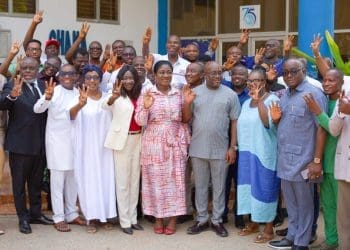The Acting Chief Executive Officer of the Ghana Cocoa Board (COCOBOD), Dr. Randy Abbey, has disclosed that COCOBOD is actively engaging the Bank of Ghana (BoG) for urgent intervention to save indigenous Licensed Buying Companies (LBCs).
The proposal under consideration is the allocation of a small portion—about 2% to 3%—of the BoG’s Cash Reserve Ratio to support indigenous LBCs.
“We’ve asked the Bank of Ghana to ring-fence part of the cash reserves to support cocoa purchases by local firms,” he explained.
He emphasised that this would not be a bailout, but a targeted measure to preserve indigenous participation in one of Ghana’s most critical export sectors.
The funds, if approved, would be directed exclusively toward financing cocoa purchases and would be structured to ensure accountability.
Time running out for local players
Though hopeful of a positive response from the BoG, Dr. Abbey cautioned that time is fast running out.
The indigenous LBCs face the risk of extinction due to the absence of the traditional syndicated loan that has long supported cocoa financing in the country.
Under the syndicated loan arrangement, COCOBOD raises funds from international banks to finance cocoa purchases.
A portion of that funding—typically set aside as a seed fund—is disbursed to LBCs, enabling them to buy cocoa beans from farmers during the main and light crop seasons.
But with the elimination of the syndicated loan in the 2024/2025 season and a continuation of that policy in 2025/2026, no such seed fund has been made available.
As a result, indigenous LBCs—many of whom lack strong balance sheets and access to commercial credit—are stranded.
60-40 cocoa purchasing arrangement
Despite the absence of a syndicated facility, the long-standing 60-40 cocoa purchasing arrangement remains in place, with 60% of cocoa allocated to international buyers and 40% left for local actors.
Speaking candidly about the financial headwinds confronting the sector, Dr. Abbey said that due to the low syndicated loans in 2024/25, there was no seed fund, which has made it difficult for indigenous LBCs to operate.
He revealed that COCOBOD will once again forgo the syndicated loan for the upcoming 2025/2026 cocoa season—a move that could leave local LBCs without the capital necessary to purchase beans from farmers.
Cost savings for COCOBOD, but at what price?
Dr. Abbey acknowledged that COCOBOD’s decision to halt syndicated borrowing has reduced the Board’s exposure to costly debt.
8% to 10% interest on syndicated loans
Currently, global lending conditions for Ghana remain tough, with interest rates on potential syndicated loans ranging from 8% to 10% due to the country’s economic challenges.
With financing conditions this harsh, Dr. Abbey said the local buying companies—most of which depend on COCOBOD’s seed funding—have been left to struggle.
GH₵3bn and GH₵3.5bn in syndicated loan
He estimates that any syndicated facility COCOBOD would seek under current market conditions could range between GH₵3 billion and GH₵3.5 billion—an amount that, while helpful, would come at a steep cost.
The looming threat to indigenous LBCs highlights the fragility of local institutions in Ghana’s cocoa value chain, and the difficult balancing act COCOBOD faces between managing national debt exposure and sustaining inclusive participation in a $2 billion industry.
Dr. Abbey indicated that COCOBOD has met with foreign buyers in Europe and North America to maintain these relationships and ensure Ghana’s beans remain attractive.














